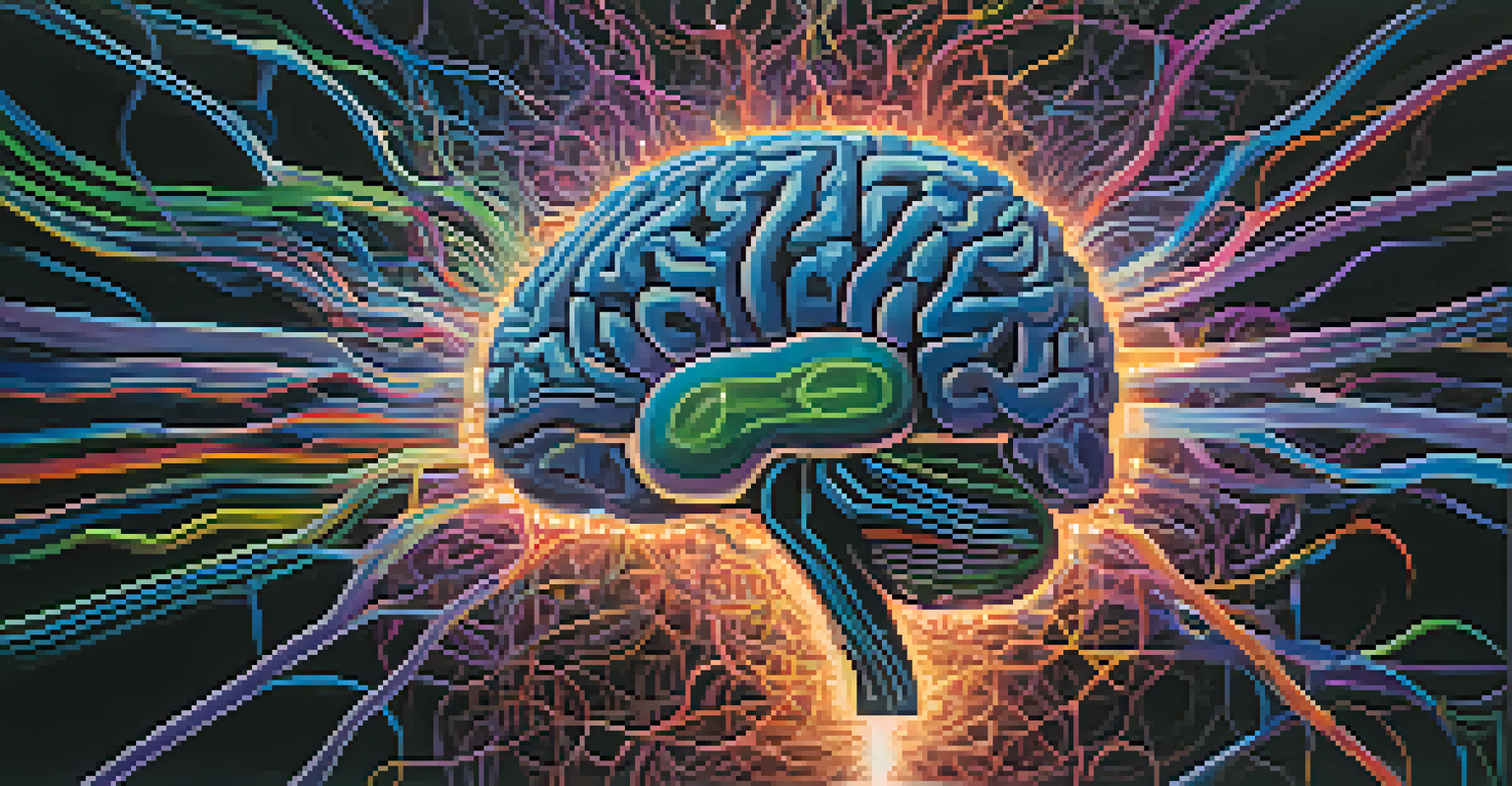Psychological Effects of Entheogens on Human Consciousness

Understanding Entheogens: A Brief Overview
Entheogens are substances that are often used in spiritual or religious contexts to induce altered states of consciousness. Common examples include psilocybin mushrooms, ayahuasca, and peyote. These substances have been used for centuries by various cultures for healing, spiritual exploration, and connecting with the divine.
Psychedelics are a tool for personal and spiritual growth, and they can open up pathways to profound insights and healing.
The term 'entheogen' comes from the Greek words that mean 'generating the divine within.' This highlights the belief that these substances can facilitate profound experiences that transcend ordinary consciousness. As interest in these substances grows, so does the need to understand their psychological effects.
With the resurgence of research into psychedelics, scientists are beginning to uncover how entheogens interact with the brain and influence our thoughts, emotions, and perceptions. This exploration is not just academic; many individuals seek these experiences for personal growth and healing.
The Science Behind Entheogens and Brain Function
Entheogens primarily interact with serotonin receptors in the brain, particularly the 5-HT2A receptor. This interaction can lead to altered sensory perceptions and heightened emotional experiences. Think of it as tuning into a different frequency of your mind, where colors may seem more vibrant and sounds more profound.

Recent studies suggest that entheogens may promote neuroplasticity, which is the brain's ability to reorganize itself by forming new neural connections. This can lead to lasting changes in mood and cognition, making it a powerful tool for mental health treatment. Imagine being able to reset your brain's default settings, allowing for new perspectives and insights.
Cultural Importance of Entheogens
Various cultures have historically utilized entheogens in spiritual rituals, highlighting their significance in community and healing practices.
Moreover, the experience can also trigger a sense of interconnectedness, where individuals feel a deep connection to others and the universe. This sense of unity can lead to significant shifts in worldview, often resulting in increased empathy and compassion.
Entheogens and Emotional Healing
Many people turn to entheogens as a means of processing trauma or emotional pain. The experiences often facilitate a release of pent-up emotions, allowing individuals to confront and heal from past wounds. Picture it as peeling back layers of an onion, where each layer reveals deeper insights and understanding.
The experience of oneness with the universe is a common theme in psychedelic experiences, often leading to a deeper understanding of ourselves and our place in the world.
Therapeutic settings using entheogens have reported significant improvements in conditions like PTSD and depression. The unique state of consciousness often leads to new ways of interpreting past experiences, fostering forgiveness and acceptance. This transformative potential is why researchers are keen to explore their use in clinical settings.
Furthermore, the emotional release experienced during entheogenic journeys can result in a profound sense of relief and clarity. Many individuals describe a feeling of weight being lifted off their shoulders, leading to a more optimistic outlook on life.
Altered States of Consciousness: A New Perspective
The altered states induced by entheogens can provide a fresh lens through which to view reality. This shift in consciousness often allows users to step outside of their daily routines and habitual thought patterns. It's like taking a mental vacation, where the familiar becomes unfamiliar, sparking creativity and new ideas.
During these experiences, individuals may encounter visions, abstract thoughts, or intense emotions that challenge their existing beliefs. This can lead to personal revelations that are difficult to articulate but can be deeply impactful. Just as dreams can reveal hidden aspects of our psyche, entheogenic experiences can bring to light unexplored facets of our consciousness.
Entheogens Induce Altered States
Entheogens facilitate altered states of consciousness that can lead to profound spiritual and emotional insights.
Importantly, these altered states can be both enlightening and overwhelming. While many report positive experiences, it's essential to approach entheogens with respect and caution, as the journey can be unpredictable.
Cultural Significance of Entheogens
Throughout history, various cultures have incorporated entheogens into their spiritual rituals and healing practices. For example, Indigenous peoples in the Americas have long used peyote and ayahuasca in sacred ceremonies to connect with the spiritual world. These practices emphasize the importance of community and shared experiences in navigating altered states of consciousness.
The cultural context often shapes the user's experience, as the set (mindset) and setting (environment) play crucial roles in the journey. When surrounded by supportive community members and guided by knowledgeable facilitators, individuals may find the experience more meaningful and transformative.
As modern society begins to embrace these ancient practices, there is a growing interest in understanding how cultural narratives influence the psychological effects of entheogens. This exploration can lead to a more respectful and informed use of these powerful substances.
Potential Risks and Considerations
While entheogens can offer profound insights, they are not without risks. Individuals with a history of mental health issues may experience adverse effects, such as heightened anxiety or psychosis. It's crucial to approach these substances with caution, ideally under the guidance of trained professionals.
Additionally, the setting in which entheogens are consumed greatly influences the experience. A supportive, safe environment can foster positive outcomes, while a chaotic or uncomfortable setting may lead to distressing experiences. Think of it as setting the stage for a play; the right atmosphere can enhance the performance.
Healing Potential of Entheogens
Many individuals use entheogens to process trauma and promote emotional healing, showing promise in treating conditions like PTSD and depression.
Being aware of these potential risks allows individuals to make informed decisions about their journeys with entheogens. Education and preparation are key to ensuring a positive and transformative experience.
The Future of Entheogen Research and Integration
As interest in entheogens grows, so does the body of research exploring their therapeutic potential. Studies are increasingly examining how these substances can be integrated into modern mental health treatments, potentially revolutionizing approaches to therapy. Picture a future where psychedelics are a common part of mental health care, offering new hope to those struggling with various conditions.
Moreover, the conversation around entheogens is evolving, with more open discussions about their benefits and challenges. This shift in societal perception is paving the way for policy changes and responsible use. Advocacy for safe, regulated environments can help ensure that these substances are used ethically and effectively.

Ultimately, the future of entheogen research holds great promise for expanding our understanding of consciousness and mental health. As we continue to explore these ancient tools, we may uncover new pathways to healing and self-discovery.